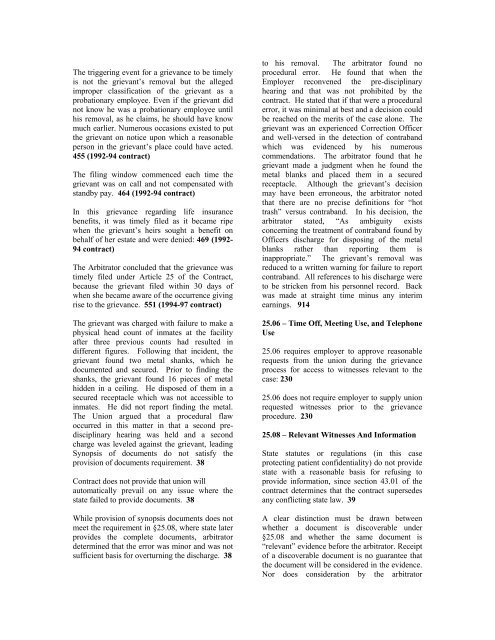by Contract Number (PDF) - OCSEA
by Contract Number (PDF) - OCSEA
by Contract Number (PDF) - OCSEA
Create successful ePaper yourself
Turn your PDF publications into a flip-book with our unique Google optimized e-Paper software.
The triggering event for a grievance to be timely<br />
is not the grievant’s removal but the alleged<br />
improper classification of the grievant as a<br />
probationary employee. Even if the grievant did<br />
not know he was a probationary employee until<br />
his removal, as he claims, he should have know<br />
much earlier. Numerous occasions existed to put<br />
the grievant on notice upon which a reasonable<br />
person in the grievant’s place could have acted.<br />
455 (1992-94 contract)<br />
The filing window commenced each time the<br />
grievant was on call and not compensated with<br />
stand<strong>by</strong> pay. 464 (1992-94 contract)<br />
In this grievance regarding life insurance<br />
benefits, it was timely filed as it became ripe<br />
when the grievant’s heirs sought a benefit on<br />
behalf of her estate and were denied: 469 (1992-<br />
94 contract)<br />
The Arbitrator concluded that the grievance was<br />
timely filed under Article 25 of the <strong>Contract</strong>,<br />
because the grievant filed within 30 days of<br />
when she became aware of the occurrence giving<br />
rise to the grievance. 551 (1994-97 contract)<br />
The grievant was charged with failure to make a<br />
physical head count of inmates at the facility<br />
after three previous counts had resulted in<br />
different figures. Following that incident, the<br />
grievant found two metal shanks, which he<br />
documented and secured. Prior to finding the<br />
shanks, the grievant found 16 pieces of metal<br />
hidden in a ceiling. He disposed of them in a<br />
secured receptacle which was not accessible to<br />
inmates. He did not report finding the metal.<br />
The Union argued that a procedural flaw<br />
occurred in this matter in that a second predisciplinary<br />
hearing was held and a second<br />
charge was leveled against the grievant, leading<br />
Synopsis of documents do not satisfy the<br />
provision of documents requirement. 38<br />
<strong>Contract</strong> does not provide that union will<br />
automatically prevail on any issue where the<br />
state failed to provide documents. 38<br />
While provision of synopsis documents does not<br />
meet the requirement in §25.08, where state later<br />
provides the complete documents, arbitrator<br />
determined that the error was minor and was not<br />
sufficient basis for overturning the discharge. 38<br />
to his removal. The arbitrator found no<br />
procedural error. He found that when the<br />
Employer reconvened the pre-disciplinary<br />
hearing and that was not prohibited <strong>by</strong> the<br />
contract. He stated that if that were a procedural<br />
error, it was minimal at best and a decision could<br />
be reached on the merits of the case alone. The<br />
grievant was an experienced Correction Officer<br />
and well-versed in the detection of contraband<br />
which was evidenced <strong>by</strong> his numerous<br />
commendations. The arbitrator found that he<br />
grievant made a judgment when he found the<br />
metal blanks and placed them in a secured<br />
receptacle. Although the grievant’s decision<br />
may have been erroneous, the arbitrator noted<br />
that there are no precise definitions for “hot<br />
trash” versus contraband. In his decision, the<br />
arbitrator stated, “As ambiguity exists<br />
concerning the treatment of contraband found <strong>by</strong><br />
Officers discharge for disposing of the metal<br />
blanks rather than reporting them is<br />
inappropriate.” The grievant’s removal was<br />
reduced to a written warning for failure to report<br />
contraband. All references to his discharge were<br />
to be stricken from his personnel record. Back<br />
was made at straight time minus any interim<br />
earnings. 914<br />
25.06 – Time Off, Meeting Use, and Telephone<br />
Use<br />
25.06 requires employer to approve reasonable<br />
requests from the union during the grievance<br />
process for access to witnesses relevant to the<br />
case: 230<br />
25.06 does not require employer to supply union<br />
requested witnesses prior to the grievance<br />
procedure. 230<br />
25.08 – Relevant Witnesses And Information<br />
State statutes or regulations (in this case<br />
protecting patient confidentiality) do not provide<br />
state with a reasonable basis for refusing to<br />
provide information, since section 43.01 of the<br />
contract determines that the contract supersedes<br />
any conflicting state law. 39<br />
A clear distinction must be drawn between<br />
whether a document is discoverable under<br />
§25.08 and whether the same document is<br />
“relevant” evidence before the arbitrator. Receipt<br />
of a discoverable document is no guarantee that<br />
the document will be considered in the evidence.<br />
Nor does consideration <strong>by</strong> the arbitrator
















